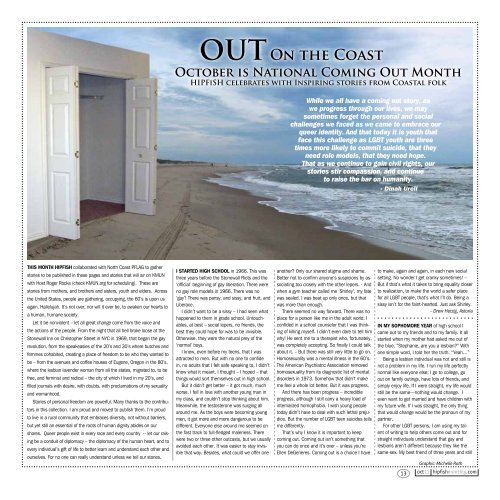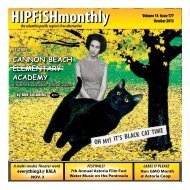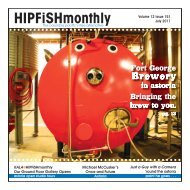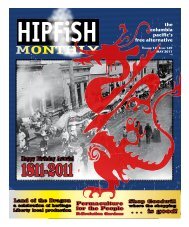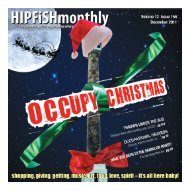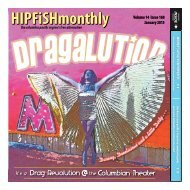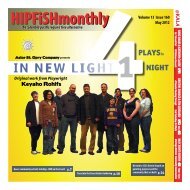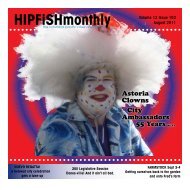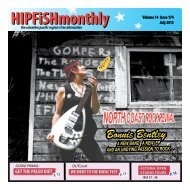NOW OPENThe North Coast’snewest state of the artanimal hospitalVeterinarian Dr. Melanie Haasebrings 16 years experience to the new Safe Harbor Animal HospitalDigital X-Ray • Major and Minor Surgery • Full in-house labLatest Dental Equipment • Member of the Emergency Rotation TeamHandicap accessible • Competitive Prices250 36th • Astoria, Oregon 503.325.8920 • safeharboranimalhospital.netOpen Mon-Fri 8am to 5:30pm, Sat 8am to noonHouse calls welcome Thursday 1pm to 5pm • Walk-ins welcome every WedThe Mysteryof Irma Vepby Charles LudlumFriday & Saturdaysthrough Oct 15Tickets $20 & $15Sponsored by Bank of AstoriaProbuild & Milgard“A. Lincoln”Friday and SaturdayOct 21 - 22 7:30pm$14 Adult $8 Student• Coming Soon •Annie GetYour Gunby Irving BerinNov 18 - Dec 30108 N. HemlockCannon Beach, ORBox Office: 503.436.1242www.coastertheatre.comPut Your Hands Where Your Heart Is… VOLUNTEER!Working with cats involves…• Cleaning and restocking cat cages• Grooming and socializing felines• Assisting with adoptions• Watching for & reporting possiblehealth issuesCLATSOP ANIMAL ASSISTANCE, INC. (CAA)Call 503.861.0737 to join our dedicated team, Tues. - Sat., noon to 4 pm(Must be sixteen or older to volunteer unless accompanied by an adult)All volunteers receive trainingoct11 hipfishmonthly.com12Laugh...Learn...Play well withothers...Check out ourPirate Loot!Games andpuzzles for kidsof all ages!503-368-4873457 Laneda Ave.Manzanita, ORWorking with dogs involves…• Walking dogs• Grooming & socializing them• Feeding the canines• Watching for & reporting possiblehealth issuesMy brotherDavid died ofAIDS in May of1991, 20 yearsago. He was47 years old. Inthe 1970’s hebecame involvedin the gay rightsmovement andbegan living whathe referred to as an“openly gay life”. Itwas during this timethat he “came out”professionally and toour family, though hehad“come out” to himself long before that.He is not here to tell his own “coming out”story, but I have put together passages fromhis many writings in the hope of portraying alittle of what it was like to be a gay man “out ofthe closet” during the 1970’s.In 1977, in the midst of some importantissues in the gay rights movement, Davidwrote a public statement to members of theentertainment industry which he had beena part of for many years. He explained hisreasons for doing this: “In actuality, what Iam doing is “coming out” professionally.” Inaddition to sending this statement to peoplein the Hollywood community, he sent copiesto various publications of the Gay Media “… inthe hope that this statement may encourageother entertainers and artists to take similarstands.” The Gay publications printed thestatement. However, he also sent copies tothe Hollywood “trade” papers, none of whichpublished the statement. David wrote thathis gay activist friends warned him that he wascommitting “professional suicide” by sendingout this statement, but David assured themthat at that point “I have no career to lose and,hence I am in a position to do and say what somany others would like to do and say, but arein fact unable to because of their professionalstatus.”The Statement:“My name is David and I am an actor - agay actor. I spent over six years in Hollywoodand during that time, I became well acquaintedwith the motion picture industry’s attitudes,mores, and social rituals. The existing system- and make no mistake about it, it is a wellentrenched system - allows the individualto do anything; as long as it is kept in “thecloset”. Any controversial activities, eitherMy Name is David andI’m an Actor – a gay actorpolitical orsexual, thatbecomepublicknowledgeare eitherfrownedupon bythe socalled“liberals”,orblatantlydiscriminatedagainst by the morereactionary members of the entertainmentcommunity. <strong>This</strong> system is harmful to thearts in general; but worse, it is stifling andrepressive to the individual artist, attemptingto create meaningful art within its confines. Incontemporary society and, specifically, in westernsociety, individuals who attain prominencein the arts are respected, even adored by thepublic who value their opinions on variousissues. There are many actors, musicians,artists and writers who, over the years, havebeen outspoken in their support of the variousissues surrounding the human rights movement.For this I commend them; but this isnot enough. The right to love and be loved isthe most personal, the most inalienable of allhuman rights. Why the silence on this issueby prominent members of the entertainmentindustry? There is probably more homosexualityand bi-sexuality among members of thearts than in anyother profession. Irepeat, why the collectiveand individualsilence? Isn’t it timefor the hypocrisy anddeceit to end? At thevery least they couldsupport the gay rightsmovement as individuals,openly and publicly.At best they couldacknowledge who andwhat they are. Thecost of such silence is the respectability andacceptance of the humanity of us all.”- June 22, 1977In 2011 it is difficult to imagine that beinggay in the entertainment industry is at all anissue, but when my brother was involved inthis world, things were very different thanBy Shelley Loringwhat they are today. One of his dreams wasto be a part of a quality picture that dealt withgay love. How I wish he would have lived tosee the making of a movie like “BrokebackMountain”.As he wrote: “The real inroads in the humanrights area will be made through the treatmentof the issues by the arts and humanities in anintelligent, sensitive and dignified manner.”Our parents were quite concerned aboutDavid’s “coming out” statement and didnot understand his need to do this. But asDavid wrote, talking about our mother: “…but she has never felt the need to, once andfor all, throw off the fear and guilt that are somuch a part of the gay person’s experiencein this society, and which can only be easedby the “coming out” process for the majorityof us. While they are both in support of me,and have been throughout the ups and downsof what living an openly gay life imposes, it isdifficult for them, as it is for most people, tototally comprehend the kind of oppression anddiscrimination I have undergone for the pastfifteen years, and even before that, throughoutschool and even childhood.” David used to sayto me: “How would you feel if you were toldby the psychiatric community that you are sick,told by the religious community that you are asinner and told by the legal community that youare a criminal?”Attitudes have definitely improved in the 30plus years since my brother “came out”, but weare still not entirely there. Until gay people canenjoy all of the rights that others in our societyenjoy, we have our work cut out for us. AsDavid wrote some 30years ago: “Many ofus have wonderedwhy it is necessary forus to defend practicesthat we know are normaland human.” Theright to “love and beloved” should nothave to be foughtfor. However, as Davidwrote: “Throughouthistory groupsShelley, Mother and Davidof individuals havebeen singled out for oppression, usually as ameans to divert public attention from the realproblems at hand. <strong>This</strong> season and for manyseasons throughout history it is the gays. Weare the easiest of scapegoats because we posea fundamental fear in the minds of bigots fromall groups.” And now in 2011, we must not letthe bigots win again!
<strong>Out</strong> On the CoastOctober is National Coming <strong>Out</strong> MonthHIPFiSH celebrates with Inspiring stories from Coastal folkWhile we all have a coming out story, aswe progress through our lives, we maysometimes forget the personal and socialchallenges we faced as we came to embrace ourqueer identity. And that today it is youth thatface this challenge as LGBT youth are threetimes more likely to commit suicide, that theyneed role models, that they need hope.That as we continue to gain civil rights, ourstories stir compassion, and continueto raise the bar on humanity.- Dinah Urell<strong>This</strong> month Hipfish collaborated with North Coast PFLAG to gatherstories to be published in these pages and stories that will air on KMUNwith Host Roger Rocka (check KMUN.org for scheduling). These arestories from mothers, and brothers and sisters, youth and elders. Acrossthe United States, people are gathering, occupying, the 60’s is upon usagain. Hallelujah. It’s not over, nor will it ever be, to awaken our hearts toa human, humane society.Let it be nonviolent – let all great change come from the voice andthe actions of the people. From the night that all hell broke loose at theStonewall Inn on Christopher Street in NYC in 1969, that began the gayrevolution, from the speakeasies of the 20’s and 30’s where butches andfemmes cohabited, creating a place of freedom to be who they wanted tobe – from the avenues and coffee houses of Eugene, Oregon in the 80’s,where the lesbian lavender woman from all the states, migrated to, to befree, and feminist and radical – the city of which I lived in my 20’s, andfilled journals with desire, with doubts, with proclamations of my sexualityand womanhood.Stories of personal freedom are powerful. Many thanks to the contributorsin this collection. I am proud and moved to publish them. I’m proudto live in a rural community that embraces diversity, not without barriers,but yet still an essential of the roots of human dignity abides on ourshores. Queer people exist in every race and every country -- let our raisingbe a conduit of diplomacy – the diplomacy of the human heart, and toevery individual’s gift of life to better learn and understand each other andourselves. For no one can really understand unless we tell our stories.I started high school in 1966. <strong>This</strong> wasthree years before the Stonewall Riots and the‘official’ beginning of gay liberation. There wereno gay role models in 1966. There was no‘gay’! There was pansy, and sissy, and fruit, andLiberace.I didn’t want to be a sissy – I had seen whathappened to them in grade school. Untouchables,at best – social lepers, no friends, thebest they could hope for was to be invisible.Otherwise, they were the natural prey of the‘normal’ boys.I knew, even before my teens, that I wasattracted to men. But with no one to confidein, no adults that I felt safe speaking to, I didn’tknow what it meant. I thought – I hoped – thatthings would sort themselves out in high school.But it didn’t get better – it got much, muchworse. I fell in love with another young man inmy class, and couldn’t stop thinking about him.Meanwhile, the testosterone was surging allaround me. As the boys were becoming youngmen, it got more and more dangerous to bedifferent. Everyone else around me seemed onthe fast track to full-fledged maleness. Therewere two or three other outcasts, but we usuallyavoided each other. It was easier to stay invisiblethat way. Besides, what could we offer oneanother? Only our shared stigma and shame.Better not to confirm anyone’s suspicions by associatingtoo closely with the other lepers. - Andwhen a gym teacher called me ‘Shirley’, my fatewas sealed. I was beat up only once, but thatwas more than enough.There seemed no way forward. There was noplace for a person like me in the adult world. Iconfided in a school counselor that I was thinkingof killing myself. I didn’t even dare to tell himwhy! He sent me to a therapist who, fortunately,was completely accepting. So finally I could talkabout it. – But there was still very little to go on.Homosexuality was a mental illness in the 60’s.The American Psychiatric Association removedhomosexuality from its diagnostic list of mentaldisorders in 1973. Somehow that didn’t makeme feel a whole lot better. But it was progress.And there has been progress – incredibleprogress, although I still carry a heavy load ofinternalized homophobia. I wish young peopletoday didn’t have to deal with such lethal prejudice.But the number of LGBT teen suicides tellsme differently.That’s why I know it is important to keepcoming out. Coming out isn’t something thatyou can do once and it’s over – unless you’reEllen DeGeneres. Coming out is a choice I haveto make, again and again, in each new socialsetting. No wonder I get cranky sometimes! –But if that’s what it takes to bring equality closerto realization, to make the world a safer placefor all LGBT people, that’s what I’ll do. Being asissy isn’t for the faint-hearted. Just ask Shirley.- Drew Herzig, AstoriaIn my sophomore year of high school Icame out to my friends and to my family. It allstarted when my mother had asked me out ofthe blue. “Stephanie, are you a lesbian?” Withone simple word, I told her the truth. “Yeah…”Being a lesbian individual was not and still isnot a problem in my life. I run my life perfectlynormal like everyone else; I go to college, goout on family outings, have lots of friends, andsimply enjoy life. If I were straight, my life wouldstill be the same—nothing would change. Ieven want to get married and have children withmy future wife. If I was straight, the only thingthat would change would be the pronoun of mypartner.For other LGBT persons, I am using my talentof writing to help others come out and forstraight individuals understand that gay andlesbians aren’t different because they like thesame-sex. My best friend of three years and stillGraphic: Michelle Roth13 oct11 hipfishmonthly.com


